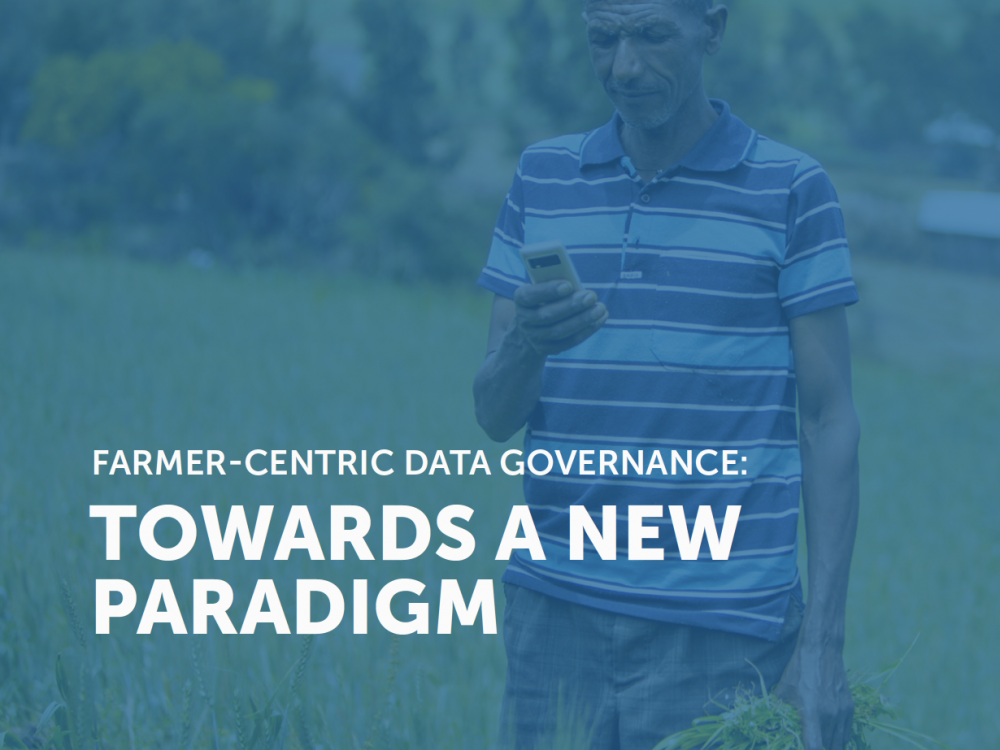Farmer-Centric Data Governance: Towards A New Paradigm
Background
The potential benefits of digital agriculture are prolific. However, farm data is generally collected by others, and smallholder farmers rely on external resources, like weather data, and proprietary tools that provide specific advisories. Farmers face a paradox: while the use of data holds much potential, control over power, resources, and data governance challenges raise the possibility that farmers do not benefit from their own data. The current data economy is defined by a paradigm of extraction and a lack of consideration of equity, whereby the role of farmers and communities goes unrecognized. Digitalization may actually redirect power and profits away from farmers, unless agriculture stakeholders take deliberate steps to change this trajectory.
Given this breakneck forward momentum, implementing fair and equitable data governance models that prioritize farmer participation while guarding farmers against disadvantages and exploitation is crucial. Empowering farmers with more control over their data is critical to improve and protect their lives. There is an immediate need to design processes for data governance and ownership that places the needs of farmers at the center.
For this reason, there is a pressing need to unpack new forms of data governance and ownership practices that give place to center farmers. User-centric, participatory data governance models can help shift the paradigm. This study moves beyond theory to explore the practical implementation of agricultural data governance practices in low- and middle-income countries. Empowering farmers with more control over their data is critical to improving and protecting their livelihoods.
About the Report
The Report, six Deep Dives, and nine Case Studies provide user-centric approaches to data governance that places farmers and their communities at the center of data gathering initiatives and aims to reduce the negative effects of centralized power. The findings are based on literature, interviews, and workshops, to gather the experiences of change-makers and aims to:
• Raise awareness around the current political economy of agricultural data and its implications;
• Identify user-centric data governance models and mechanisms, particularly in LMICs;
• Demonstrate the purpose, value, benefits, and challenges of these models for all stakeholders; and
• Identify appropriate and relevant actionable principles, recommendations, and considerations related to user-centric data governance in the agriculture sector for the donor community.
This project is made possible by the generous support of the American people through the United States Agency for International Development (USAID), as well as support from the Bill & Melinda Gates Foundation (BMGF). This guide was produced under DAI’s Digital Frontiers Project at the request of USAID and BMGF.
Report
• Farmer-Centric Data Governance: Towards A New Paradigm
• The Data Governance Journey Map
Deep Dives
• Deep Dive: Data Collaboratives
• Deep Dive: Data Commons
• Deep Dive: Data Cooperatives
• Deep Dive: Data Fiduciary Models – Data Marketplaces
• Deep Dive: Data Trusts
• Deep Dive on Indigenous Data Sovereignty
Case Studies
• Case Study: An Agricultural Data Cooperative for Farmers and Farmer Cooperatives
• Case Study: Building a Neutral Account Aggregator Data Ecosystem for Smallholder Farmers
• Case Study: Enabling Farmers with a Farmer-centric Transparent Supply Chain and Premiums
• Case Study: Farmer Cooperatives in Uganda United in a Data Collaborative
• Case Study: A Fertilizer Data Collaborative’s First Steps Towards Farmer-Centricity in Nigeria
• Case Study: A Humanity-centric Journey Towards Digitally Empowered Fishers
• Case Study: A Multi-centric Data Governance Approach to Secure Land for Cocoa Farmers
• Case Study: Utilizing Supply Chains to Protect Coffee and Sacred Lands and to Sequester Carbon
• Case Study: When Traditional Stewards of Lands and Forests Become Stewards of their Data

